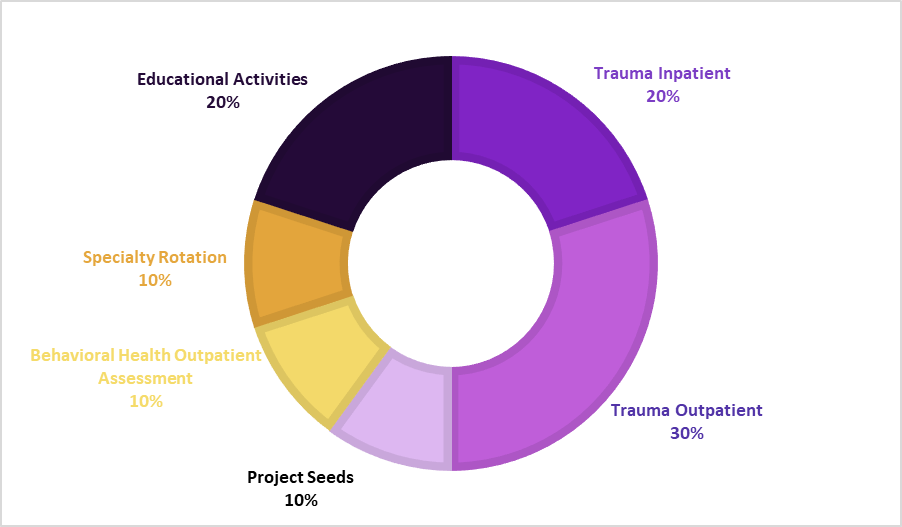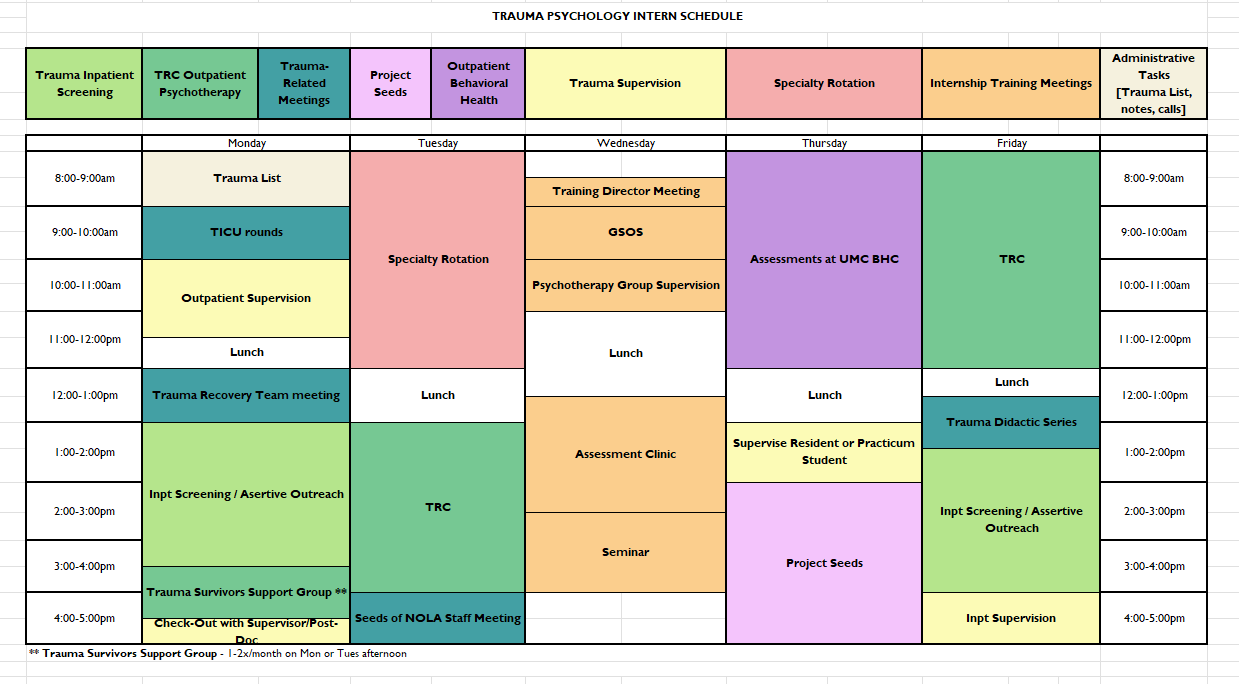Trauma Psychology Track
(1 position)
OVERVIEW
The Trauma Psychology internship track offers a combination of unique training opportunities for developing trauma-focused, empirically-informed competencies and working with adults and families impacted by trauma. The intern on this track will provide inpatient and outpatient assessment and treatment of trauma-related distress/ disorders in the acute aftermath of an event involving serious physical injury. The primary training site for this track is University Medical Center New Orleans, which houses the only Level 1 Trauma Center in the Southern Louisiana region and the first Trauma Recovery Center in the state.
Below is a breakdown of how a trauma intern will spend their time and a sample schedule:


|
TRAUMA INPATIENT |
The intern will be responsible for providing clinical consultation, screening, and brief intervention for mental and behavioral health concerns for patients admitted to the trauma surgery service. Using a Stepped Collaborative Care Model, interns will have the opportunity to support patients and their loved ones who are recovering from a wide array of physical injuries, including but not limited to motor vehicle accidents, gunshot wounds, work-related injuries, injuries resulting from community violence, and other accidental injuries.
|
TRAUMA OUTPATIENT |
The intern will also provide outpatient mental health services at UMC’s Seeds of NOLA Trauma Recovery Center (SoN TRC). Rooted in principles of health equity and social justice, the center provides wraparound care to people whose lives have been disrupted by tramatic injury, violent crime and traumatic bereavement. The Trauma Recovery Team consists of case managers, social workers, psychologists, psychiatrists, violence intervention specialists, and violence interrupters who are dedicated to providing inclusive, trauma-informed services. SoN TRC services include but are not limited to evidence-based psychotherapy, psychiatric medication management, assertive case management and violence prevention/intervention. Using a strengths-based approach, the team works closely with other healthcare providers to maximize both mental and medical health outcomes for survivors of trauma and violence with a focus on reaching survivors from underserved communities. Collaboration with community partners allows Seeds of NOLA staff to connect survivors with additional resources that support the healing process, such as employment, transportation, legal and housing assistance.
The Trauma Psychology intern will maintain a steady caseload of approximately 5-7 complex patients, all of whom have histories of trauma, which may include acute and chronic physical or sexual abuse, interpersonal violence (e.g., sexual assault, physical assault, domestic violence), community violence (e.g., gunshot wound, stab wound), accident- or work-related injuries (e.g., motor vehicle collision), political torture and immigration trauma. Most clients also have concurrent medical and psychosocial concerns. Outpatient clinical services provided by the intern include trauma-informed intakes for new patients, assessment of service needs and presenting issues, short-term individual trauma therapy, liaison with other health care providers and consultation to a multidisciplinary treatment team.
Based on interest and availability, further learning opportunities for the Trauma Psychology intern may include co-facilitation of Trauma Survivor Support Groups, interdisciplinary rounds/observation, violence prevention and intervention training, and departmental, interdisciplinary, and/or conference presentations
|
Project Seeds |
The Trauma Psychology intern will identify and champion a project that aligns with the mission and values of Seeds of NOLA. Potential projects may include trauma-focused research, community outreach initiatives, development and co-facilitation of Secondary Traumatic Stress group for healthcare workers, employee wellness initiatives, program development (e.g., peer visitor program), and developing enduring educational and training materials. Trauma Psychology intern may develop new projects or add to existing initiatives.
|
BEHAVIORAL HEALTH OUTPATIENT |
UMC’s Behavioral Health Clinic (BHC) offers a diverse range of outpatient mental health services to underserved communities in the greater New Orleans region. As an intern at the BHC, you will be responsible for conducting comprehensive assessments of adult patients referred for various psychiatric, neurological, and behavioral concerns. Your approach will be personalized, guided by your clinical supervisor, and based on the referral question. Assessment services are available to individuals aged 18 and above.
Interns are required to maintain an active assessment case at all times, with adjustments to their caseload based on the complexity of the assigned cases (usually 1-2 per month on average). Most assessment services at the BHC consist of two sessions, with additional sessions scheduled as necessary. Within one month of completing all testing aspects, including gathering collateral reports from caregivers and loved ones, interns provide results with suitable recommendations during 60-minute feedback session appointments. Providing feedback and recommendations is particularly important. Interns will be responsible for conveying the test results, interpretations, and recommendations to patients and other relevant stakeholders, such as caregivers and referring professionals. This feedback helps in promoting understanding and collaboration in the treatment process. Finally, cultural factors play a significant role in mental health overall and psychological testing is no exception. Assessment should take into account cultural differences and be sensitive to the cultural backgrounds of the patients. Interns will also be encouraged to identify the particular strengths and weaknesses of a given test battery for that patient.
|
SPECIALTY ROTATION |
Interns also have a half day a week to participate in a specialty rotation of their choice. For more information on specialty clinics, see: https://www.medschool.lsuhsc.edu/psychiatry/clinical_psychology/cp_sample_elective_experiences.aspx
|
Educational Activities |
Assessment Group Supervision:
This weekly group supervision allows all interns to formally present assessment cases
of infants, children, adolescents, and adults evaluated through the outpatient clinics.
Fundamentals of psychological testing including test administration, selection of
testing instruments, collection of collateral reports, integration of testing data,
report writing, recommendations for feedback sessions etc. will be discussed throughout
the year. Integration of test data, history, and DSM 5 diagnostic criteria will be
emphasized with particular attention placed on differential diagnosis. More advanced
levels of diagnostic and treatment issues with various populations are also presented
(e.g., the borderline conditions, the spectrum of narcissistic disorders, and the
spectrum of depressive disorders).
Psychology Seminar:
This weekly seminar discussion session consists of various special topics in clinical
psychology, ethical decision-making, and professional development as a psychologist.
Multidisciplinary core faculty and outside lecturers (e.g. psychologists, psychiatrists and
social workers) discuss a variety of issues including juvenile violence, licensing
issues, cultural diversity, financial issues following graduation, psychopharmacology and
challenging treatment issues. If available, additional topics may be included at the
request of the current intern class. The early part of the year will focus on covering
Louisiana laws related to the practice of psychology, suicide/homicide assessment,
and child/elder abuse reporting. There are also quarterly seminars related to supervision
and multicultural awareness as well. In addition, each psychology intern is required
to make a formal presentation/job talk on a topic or issue of their choice prior to
the end of the training year.
Psychotherapy Group Supervision:
This unique, year-long supervision involves presentations of therapy cases seen at the various training settings. Psychology interns formally present cases which are then discussed as a group. The focus of the discussion is on deepening case conceptualization, understanding the cultural formulation of the case, discussing transference and countertransference that may arise in the treatment, and brainstorming other potential therapeutic techniques that could be beneficial to the individual case. Interns are welcome to bring videos from session to enhance discussion about psychotherapy cases.
Group Supervision of Supervision:
This group meets weekly and is intended to focus on the intern's development of their
own supervision skills as a necessary part of their professional development as psychologists.
Interns are encouraged to bring issues that arise during supervision sessions as well
as their successes from their experiences in the role as supervisor to process with
the group.
Other Educational Experiences:
While on the primary rotations, interns will be required to attend in service and
other training activities, which are germane to their functioning as members of the
multidisciplinary team.
Psychiatry Grand Rounds, including case conferences, are held at LSUHSC three times per month. Departmental, local, national, and international experts give presentations on diagnostic and treatment issues, biological psychiatry, epidemiological findings, socio-political issues, theoretical developments, and philosophical issues in clinical psychiatry. Interns also have an open invitation to attend lectures offered by the New Orleans-Birmingham Psychoanalytic Center.
New Orleans is a popular city for continuing education programs and conventions. In the last several years the American Psychological Association, National Training Institute: Zero to Three, the Society for Research in Child Development, the Society for Personality Assessment, the International Neuropsychological Association, the American Academy of Child and Adolescent Psychiatry, and the Louisiana Psychological Association have held their annual conventions in New Orleans.


